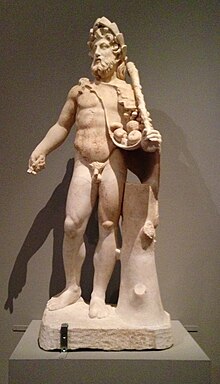| Vertumnus | |
|---|---|
God of seasons, change, gardens, fruit trees, and plant growth | |
 Statue of the 1st or 2nd centuries AD. | |
| Symbols | gardening tools |
| Festivals | Vertumnalia |
| Consort | Pomona |
| Equivalents | |
| Etruscan | Voltumna |

In Roman mythology, Vertumnus (Latin pronunciation: [wɛr'tʊmnʊs]; also Vortumnus or Vertimnus) is the god of seasons, change[1] and plant growth, as well as gardens and fruit trees. He could change his form at will; using this power, according to Ovid's Metamorphoses (xiv), he tricked Pomona into talking to him by disguising himself as an old woman and gaining entry to her orchard, then using a narrative warning of the dangers of rejecting a suitor (the embedded tale of Iphis and Anaxarete) to seduce her. The tale of Vertumnus and Pomona has been called "the first exclusively Latin tale."[2]
Vertumnus' festival was called the Vertumnalia and was held 13 August.[3]
- ^ " Vertumnus then, that turn'st the year about," (Thomas Nashe, Summer's Last Will and Testament (1592, printed 1600)).
- ^ It is called the first exclusively Latin tale by Charles Fantazzi, "The revindication of Roman myth in the Pomona-Vertumnus tale", in N. Barbu et al., eds. Ovidianum (Bucharest, 1976:288), as Roxanne Gentilcore notes in "The Landscape of desire: the tale of Pomona and Vertumnus in Ovid's 'Metamorphoses'", Phoenix 49.2 (Summer 1995:110-120), p. 110 ("It has also been called the first exclusively Latin tale") and note 1.
- ^ Ovid, Fasti.